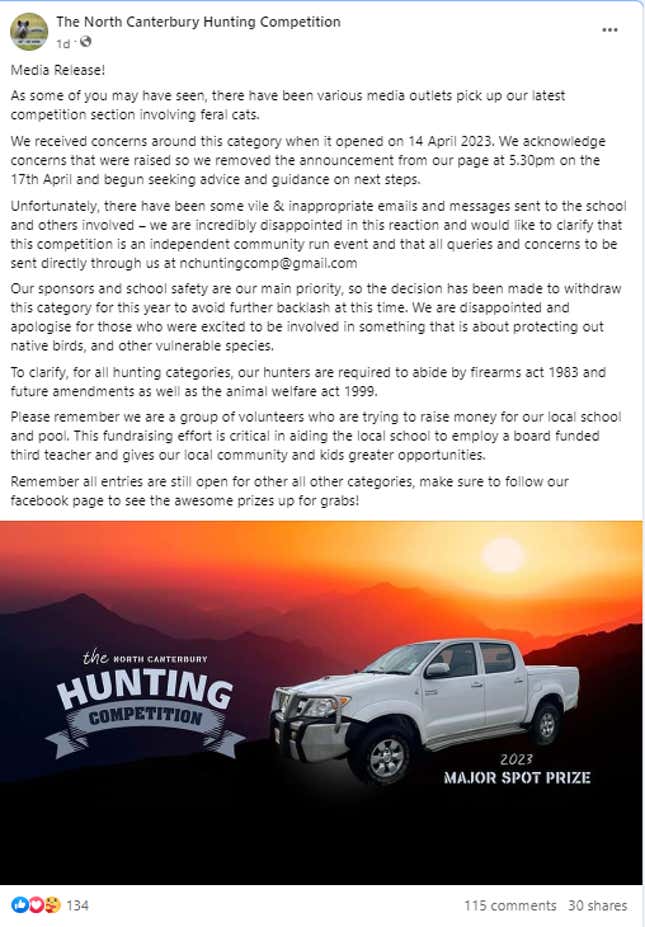Children of New Zealand, lay down your arms and step away from the feral cats. The opportunity to fire on felines for a cash prize is no more.
A feral cat hunting contest for kids under 14 years old, slated to take place in North Canterbury on New Zealand’s South Island, is officially cancelled following days of intense pushback. The North Canterbury Hunting Competition announced its resolution to scrap the segment in a Tuesday Facebook post.
Advertisement
“The decision has been made to withdraw this category for this year to avoid further backlash at this time,” the organizers wrote. “We are disappointed and apologise for those who were excited to be involved in something that is about protecting [our] native birds, and other vulnerable species.”

Advertisement
The now-defunct plans for a youth cat killing spree came as part of the wider North Canterbury Hunting Competition. The event is an annual community fundraiser for a local elementary school and swimming pool. Participants pay to enter, and category winners receive small payouts.
This year was the first time that the feral cat category was introduced. The plan was for kids to compete to off the highest number of invasive felines. The most successful child would have won a $250 NZD prize (equivalent to about $155 USD), according a now-removed weekend post from the event organizers, the Guardian reports.
Advertisement
However, basically as soon as the competition was introduced, criticism poured in. On Facebook, the event page currently has a 1.3 star rating. 15 out of 16 of the written reviews are strong critiques of the cat contest. “What kind of sick nut job encourages kids to kill cats? Training the future criminals of tomorrow…Worst idea ever!” wrote one incensed poster. “Disgusting group of sadists,” said another.
Though the contest organizers noted that any participants would be disqualified for harming a microchipped cat, animal rights groups still expressed significant concern that pets would be hurt and also general alarm at the idea of enlisting children to cull animals. “There is little to no difference in the physical appearance of feral, stray, and pet cats. Disqualifying dead cats with microchips is too little too late,” said Will Appelbe, a spokesperson for New Zealand-based animal rights organization SAFE, in a statement. “It’s bad enough that young people are being taught and encourage to kills small animals,” he added.
Advertisement
The Canterbury Society for the Prevention of Cruelty to Animals said it was “extremely concerned” about the contest in a statement. “There is a good chance someone’s pet may be killed during this event,” the organization wrote. “SPCA advocates that, instead of organised killing events, education around humane and compassionate practices can better prepare young people to appreciate and protect the biological heritage of New Zealand.”
Yet for others, the controversial contest idea was less black and white.
Feral cats are an invasive and ecologically destructive species in New Zealand and in much of the world. Domestic cats (whether free-roaming pets or feral) are predators that can decimate populations of native wildlife, even contributing to animal extinctions. Cats are a particular threat to birds, and one 2016 study found that at least 40 bird extinctions are attributable to invasive cats worldwide. Yet globally, the question of controlling these cats frequently becomes a third-rail issue for conservation orgs, which often find themselves at odds with pet lovers and other advocacy groups.
Advertisement
Related: 10 Species Driven Toward Extinction by Cats
New Zealand’s government works aggressively to manage its feral cat problem. The country’s Department of Conservation already shoots, poisons, and traps the animals regularly. And kids under 14 already participate in other categories of the North Canterbury Hunting Contest. In 2022, more than 250 children entered the competition, killing 427 animals (mostly possums, rabbits, and hares—which are also problematic invasives in New Zealand), according to the Guardian.
Advertisement
Elsewhere in the country, community culling efforts of invasive species aren’t uncommon. Often both children and adults participate, as in the annual Great Easter Bunny Hunt that seeks to tackle the problem of invasive rabbits. But it’s difficult for animal lovers to celebrate and rally around killing cats.
“There is no right or wrong here,” James Russell, a University of Auckland conservation biologist, told the New York Times. New Zealanders, he said, generally understand and agree that feral cats need to be controlled. However, the question of a child cat hunt “touches on all these broader ethical issues: Should kids be the one[s] killing cats? Should it be done as a charity competition event?” Russell pondered.
Advertisement
“On one hand, there’s this argument we shouldn’t be teaching kids to kill animals — which is true. But if we don’t teach them about the impacts of feral cats and possums, we’re essentially turning a blind eye to their impact,” he added.
One of the organizers of the North Canterbury event, Mat Bailey, told NYT the issue had been “blown out of proportion.”
Advertisement
“It’s not just that we want kids to kill cats, it’s the whole problem” of invasive species, Bailey said. The hunting contest was supposed to be about community fundraising and “teaching kids firearms safety; it’s just a general fun activity for them—getting them out in the fresh air, and it’s making them realize these animals are destroying native species,” he added.
In the future, Bailey offered, maybe adjustments could be made to reintroduce the feral cat contest category in a more palatable way. Perhaps the kids could trap or round up the cats. For this year, the rest of the competition— including segments for children—will go ahead as planned. The feral cats though, remain safe from the kiddie wrath.
Services Marketplace – Listings, Bookings & Reviews